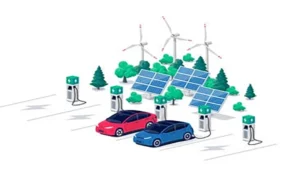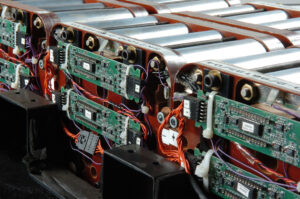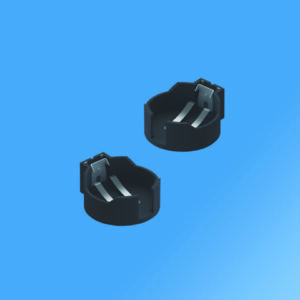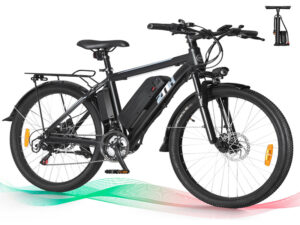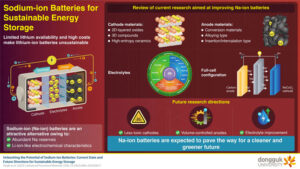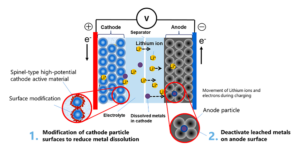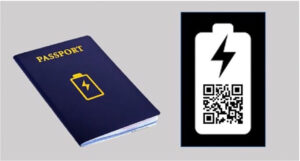The urgency of mitigating climate change and reducing greenhouse gas emissions has prompted businesses to adopt more sustainable transportation solutions, particularly electric vehicles (EVs). Lithium-ion batteries (LIBs) are at the forefront of electrification. McKinsey predicted that the entire LIB chain, from mining through recycling, could grow by over 30% annually from 2022 to 2030, reaching…
Research shows improvements for fast-charging of Li-ion batteries
Researchers at Chung-Ang University used high-concentration electrolytes to improve safety and prevent cell swelling caused by lithium plating. To achieve a greater adaption of electric vehicles, the automotive industry needs fast-charging batteries that don’t compromise energy density. Lithium plating for ultra-fast charging raises safety concerns due to high cell polarization, requiring careful attention. During fast…
24mm lithium coin cell holder space-saving and top-loading
A breakthrough lithium coin cell holder for maximizing PC board capacity when installing high-capacity 2477 lithium coin cells in high-density applications is now available from Keystone Electronics. Its top-loading design allows for minimal footprint board layouts without restricting battery access in devices. This sturdy holder is supplied in a thru-hole version and is extremely rugged,…
Trigger alerts when Li-ion batteries get too hot
TTape from Littelfuse, set of temperature-triggered switches, raises a bit that indicate hot batteries. Li-ion batteries can get hot, which can cause failures or worse in the products they power. Thus, it’s important to monitor their temperature and act before damage occurs. You can monitor temperature with a set of thermocouples, scan them, and write…
What are e-bikes?
In this article, we’ll explore the types of e-bikes available and their features. In terms of e-mobility, e-bikes stand out as a compact, affordable option for many.
Sodium-ion batteries: the future of sustainable energy storage
Lithium-ion batteries (LIBs) have become essential for energy storage systems. The limited availability of lithium, however, has raised concerns about the sustainability of LIBs. In a new study, scientists from Dongguk University reviewed the recent advances in sodium-ion battery technology, a potential alternative to LIBs. Their findings can inspire young researchers to combat the current…
New lithium-ion battery with cobalt-free 5V class high-potential cathode
Toshiba Corporation has developed a new lithium-ion battery using a cobalt-free 5V-class high-potential cathode material that significantly suppresses performance-degrading gases produced as side reactions. This battery can operate in a wide range of applications, from power tools to electric vehicles. Cobalt and nickel are widely used to stabilize the cathodes of lithium-ion batteries. However, cobalt…
US Department of Energy confirms California’s Salton Sea as a rich lithium resource
The US Department of Energy (DOE) announces the results of the most comprehensive analysis to date quantifying the domestic lithium resources in California’s Salton Sea region. Conducted by DOE’s Lawrence Berkeley National Laboratory, the analysis found that with expected technology advances, the Salton Sea region’s total resources could produce more than 3,400 kilotons of lithium,…
Lithium Iron Phosphate cell capable of charging from 20% to 80% in six minutes
DESTEN Inc. announced the launch of the latest cell technology advancement, an Ultra-Fast Charging, 6C LFP (Lithium Iron Phosphate) cell. The latest pouch form-factor cell from DESTEN is capable of charging from 20% to 80% SOC in 6 minutes. Owing to its LFP-based chemistry, this cell features an impressive chemical and temperature stability profile, making…
What is a lithium battery digital passport?
A digital battery passport provides easy access to structured, reliable, and complete information about the battery. This fresh initiative in the US lithium battery landscape aims to simplify consumers’ choice and use of batteries. The US government agencies are working on battery passport requirements, centralizing battery specifications and pertinent details, making it user-friendly for the…

